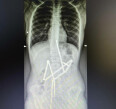
- News
- Let's smell more actively. Some smells can improve brain function during sleep
News

Let's smell more actively. Some smells can improve brain function during sleep
Scientists from the University of California, Irvine have found that the presence of certain odors in the air during sleep can improve cognitive function. This may help to maintain the working capacity of the brain in older age.
The study was published in the journal Frontiers in Neuroscience. Experts conducted an experiment with 43 people aged 60 to 85 years, using different perfume combinations of fragrances. This allowed them to establish the ability of fragrances to slow down the decline in cognitive function and even stop the development of diseases such as dementia. "The sense of smell is particularly privileged because it is directly linked to brain memory circuits," said neuroscientist Michael Yassa. From a physiological perspective, the ability to smell in humans declines before cognitive decline, correlating with brain cell loss, underscoring the close connection between the sense of smell and neurological function.
In the experiment, 20 participants received a set of natural oils with scents such as rose, orange, eucalyptus, lemon, mint, rosemary, and lavender, while others received a sham set. All participants had to use the oils with a diffuser to spray the scent for two hours every night.
Six months after the study ended, the researchers did a series of neuropsychological tests where they compared the participants' memory, verbal learning, planning, and attention scores before and after six months of exposure to the scents. The results were impressive: people who inhaled natural oils showed a 226% increase. Further brain scans revealed positive changes in the connections between different parts of the gray matter, which play a key role in memory and thinking.
All study participants were mentally healthy. Therefore, in the future, the researchers plan to conduct a similar study with people who have cognitive impairment.
Photo: sarsmis














